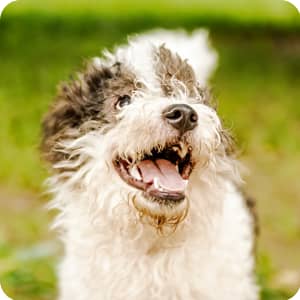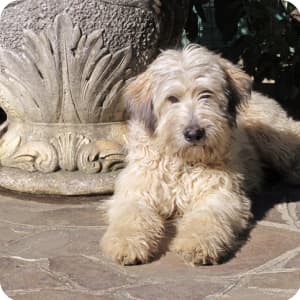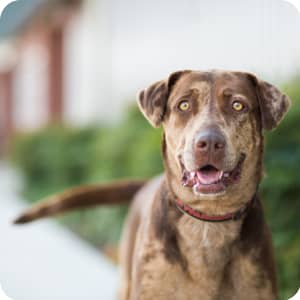Best Dog Breeds for Nurses
 Credit: Getty Images
Credit: Getty ImagesFor the busy nurse, wouldn’t it be nice if you had a way to instantly remove the stress from work as soon as you get home? A dog can provide on-demand entertainment and companionship that may be just what you need to decompress after a chaotic shift.
Caring for a dog may be less work than a patient, but their needs don’t always fit with the schedule demands of a busy nurse. We discuss the best dogs for nurses based on how their temperament, personality traits, and maintenance align with a nurse’s unique lifestyle.
Benefits of Having a Dog
It is no secret that nurses endure a ton of stress on the job and that stress management is a key component to living a healthy life. When nurses become pet-parents, they may experience positive impacts on both their physical and mental well-being.
According to the American Kennel Club, interacting with a dog can lower a person’s cortisol levels and blood pressure, reducing the risk for cardiovascular events. Stress relief benefits don’t stop here; spending time with a dog can also improve a nurse’s mood and coping skills.
Adopting a happy companion helps a nurse feel less alone. Whether a nurse is away from home on a travel assignment or forced inside due to social distancing, bringing home a dog is a great way to combat loneliness.
Before you start filling your home with treats and toys, note that having a dog is a commitment, so it’s best to ask:
- Can you afford the basic annual costs, which can run more than a couple hundred dollars, of owning a dog?
- Do you have the time to provide a dog with proper training and exercise?
- Are you able to adequately socialize the dog?
Pro tip: Consider fostering a dog before committing to see if it’s a good fit. It may be best to seek out an older, house-trained dog rather than a puppy to accommodate a nurse’s lifestyle.
Top Dog Breeds for Busy Nurses
Nurses may have unpredictable working hours, often accepting last-minute requests to work overtime, come in early, or stay late. When you adopt a dog, create a plan to ensure your pet’s needs are met while working. Identify a neighbor or dog-walking service that can take your dog out in case you get stuck at the hospital longer than planned.
Now that you have an idea of the reality of taking care of a dog let’s discuss which breeds are the best fit for nurses. Keep in mind that your fur-baby doesn’t have to come from a breeder — your new companion could be waiting for you at a pet shelter today.

Basenji
The Basenji is a smart breed with human-like emotions. Small and self-sufficient, they are good for nurses who live in apartments. Basenjis are trainable but adventurous and need boundaries to not explore beyond their homes.
Defining trait: Independent
Pros: Smart, resourceful, easy to train
Cons: Energetic and require a lot of exercise

Chinese Shar-Pei
The fiercely loyal Chinese Shar-Pei will have your back when it seems like the odds are against you. Nurses should be prepared to give this breed a moderate amount of exercise and diligent behavior training. The Shar-Pei is a devoted family dog with a charming personality given proper training.
Defining trait: Loyal
Pros: Social, devoted, low-maintenance grooming
Cons: Stubborn

Shih Tzu
If the phrase “live, love, laugh” was a dog, it would be a Shih Tzu. These affectionate lapdogs are the perfect companion for a nurse to cozy up with after work. Shih Tzus have an infectious personality that will lift the mood of anyone they are around.
Defining trait: Outgoing
Pros: Faithful companions, good family dogs, travel well
Cons: The Shih Tzu’s coat is high maintenance, requiring regular grooming. Training can be a challenge, as the Shih Tzu may try to charm their way out of discipline.

Bolognese
The Bolognese is a laid-back breed that gets along well with people and other dogs. Thanks to their ability to adjust to new situations, the Bolo would make an agreeable companion for a nurse with an active lifestyle.
Defining trait: Easygoing
Pros: Social, adaptable, friendly
Cons: Prone to separation anxiety; does not do well when left alone for long periods

Pekingese
A nurse looking to develop a strong bond with a canine companion should consider adopting a Pekingese. This small breed is as lovey-dovey as they come and is known for its charming and confident personality.
Defining trait: Affectionate
Pros: Loyal, playful, good watchdogs
Cons: High maintenance to groom, stubborn, should be monitored when playing with small children

Bergamasco Sheepdog
Like a new grad who is ready to fly from orientation early, the Bergamasco Sheepdog is an independent and highly intelligent breed perfect for any nurse. Their virtually no-maintenance mane makes for a low-cost grooming regimen. An ideal owner for a Bergamasco is a nurse who can regularly exercise and train the dog.
Defining trait: Intelligent
Pros: Easy to train, social, low-maintenance grooming
Cons: Thinks independently; needs strict training so they won’t outsmart their owner

Boerboel
If you are looking for a protective but calm dog, consider this large (up to 200 pounds) breed. The Boerboel makes for a loyal companion and has a strong commitment to its pack. When raising a Boerboel, nurses should establish themselves as leaders, so the dog does not claim the role. After thorough training, this highly intelligent breed will be ready to take on any adventure their nurse owner presents.
Defining trait: Confident
Pros: Low maintenance, obedient, highly devoted to their owners
Cons: Because Boerboels are dominant in nature, they may not be the best fit for a first-time dog owner.

Broholmer
A willing companion for outdoor activities like camping and hiking or simply playing fetch in the backyard, the Broholmer is a good fit for an outdoorsy nurse. When they finish exploring, these self-proclaimed lapdogs are quick to snuggle up to their favorite nurse on the couch.
Defining trait: Loving
Pros: Devoted and friendly companions for the whole family
Cons: This breed may be wary of strangers and should be supervised when playing with small children. They produce a moderate amount of drool, so keep a handkerchief nearby if secretions aren’t your thing.

French Bulldog
The French Bulldog is a cuddly lapdog with a playful personality. Frenchies make an ideal companion for nurses who sleep during the day because they are well behaved and don’t bark much. This breed does not require much exercise and is well-suited for apartment life.
Defining trait: Playful
Pros: Well behaved, fun personality, minimal shedding
Cons: The French Bulldog has never met a stranger, so owners should set boundaries and keep a close eye on these pups.

Heinz Hound
Some of the best dogs are just a mix of many different breeds. When you adopt from the shelter, each dog should have details on its temperament and quirks. So long as your mutt’s temperament is aligned with your needs, you’re guaranteed to find a good companion in a mutt.